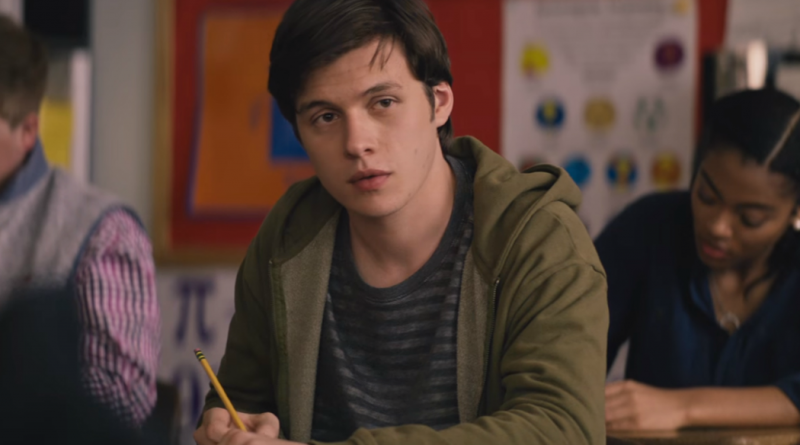“Love, Simon” And The Radical Power Of Seeing Yourself On The Big Screen
![]() Brett Slaughenhaupt
Brett Slaughenhaupt
Movie Columnist & Social Media Director
Warning: this article covers major plot points from the film “Love, Simon.”
At the climax of the “Love, Simon,” our titular character is outed online via an acquaintance, Martin, who had gotten ahold of online correspondences between himself and another closeted classmate. Understandably this act causes a stir, forcing Simon to follow the narrative rather than take charge of it.
Everything from an uncomfortable coming out to his family, unrelated drama with his friends and public humiliation from the school bullies comes about as a result. Emotions pique when Martin attempts to apologize. Simon tells him off by saying, “I’m supposed to be the one that decides when and how and who knows, and how I get to say it, that’s supposed to be my thing!”
This is an especially poignant scene for many reasons. Being outed took away Simon’s agency to speak his truth in the way he wanted — earlier in the film he admits his family and friends would welcome his coming out, but he was nervous of the inevitable change. It also jeopardized his first relationship with another gay classmate. The third reason takes us out of the film, itself, to reflect on Hollywood and the surrounding world in which we live.
&’ async type=’text/javascript’>&’ async type=’text/javascript’>&’ async type=’text/javascript’>&’ async type=’text/javascript’>&’ async type=’text/javascript’>&’ async type=’text/javascript’>&’ async type=’text/javascript’>&’ async type=’text/javascript’>&’ async type=’text/javascript’>&’ async type=’text/javascript’>&’ async type=’text/javascript’>&’ async type=’text/javascript’>&’ async type=’text/javascript’>&’ async type=’text/javascript’>&’ async type=’text/javascript’>
>>Opinion | “Deeply Disappointed”: Editor Responds To President Spina
“Love, Simon” is the first major Hollywood studio film to cover this territory at all. Although it is most certainly not the first film to navigate queer identities — 2017 gave us the critically acclaimed indie film “Call Me By Your Name” and the year before that Best Picture-winner “Moonlight.”
What sets Simon apart from those two, and other films before them is who the film is for and how it is marketed. Every year teenage American audiences have films made just for them, relaying their experiences of awkward teenage follies back to them. This film joins the pack of teenage fare, like “Easy A,” “10 Things I Hate About You,” “Breakfast Club” and all the other films depicting this stage of life before and after them.
For the wider public (read: straight, white) “Love, Simon” and the attention it is receiving may seem blown out of proportion. After all, it’s just another run-of-the-mill story about a teenager. But that’s the point — queer teenagers are seeing themselves reflected onto the big screen in major cinemas across the country in a fashion that not only validates their story, but normalizes it.
&’ async type=’text/javascript’>&’ async type=’text/javascript’>&’ async type=’text/javascript’>&’ async type=’text/javascript’>&’ async type=’text/javascript’>&’ async type=’text/javascript’>&’ async type=’text/javascript’>&’ async type=’text/javascript’>&’ async type=’text/javascript’>&’ async type=’text/javascript’>&’ async type=’text/javascript’>&’ async type=’text/javascript’>&’ async type=’text/javascript’>&’ async type=’text/javascript’>&’ async type=’text/javascript’>
Before this film, they had to do the mental work to match their experiences with that of the characters of their favorite movies, which can be easier said than done when the entire film is about said character’s love life.
There are obvious shortages to the story being told by a white, cisgender, middle-class boy growing up in the suburbs, but that is more a fault of the industry rather than the film, itself. By broadening our scope of representation, hopefully, this brings to light all of the people we have been missing out on.
Specifically looking at this movie, one character shines both as offering a different experience to what “gay” means and as a completely unrepresented figure in popular culture. Ethan, the character in question, is a black, femme gay student who is unapologetically out at school despite vicious bullying and navigates going back in the closet for his family. He isn’t given more than 10 minutes of screentime but leaves such an impression that hopefully grants future projects to follow this sort of character more fully.
On a personal level, I can’t tell you how overwhelmed — and caught off guard by how overwhelmed I was — at having an audience of peers cheer on a character who loves like me as he successfully navigated life and love.
It is high time Hollywood caught up with the real world to allow others’ true selves to be captured on the big screen, giving them the same experience. To quote Kumail Nanjiani, “Now straight, white dudes can watch movies starring me and you relate to that. It’s not that hard. I’ve done it my whole life.”
Photo Taken from much.com.


